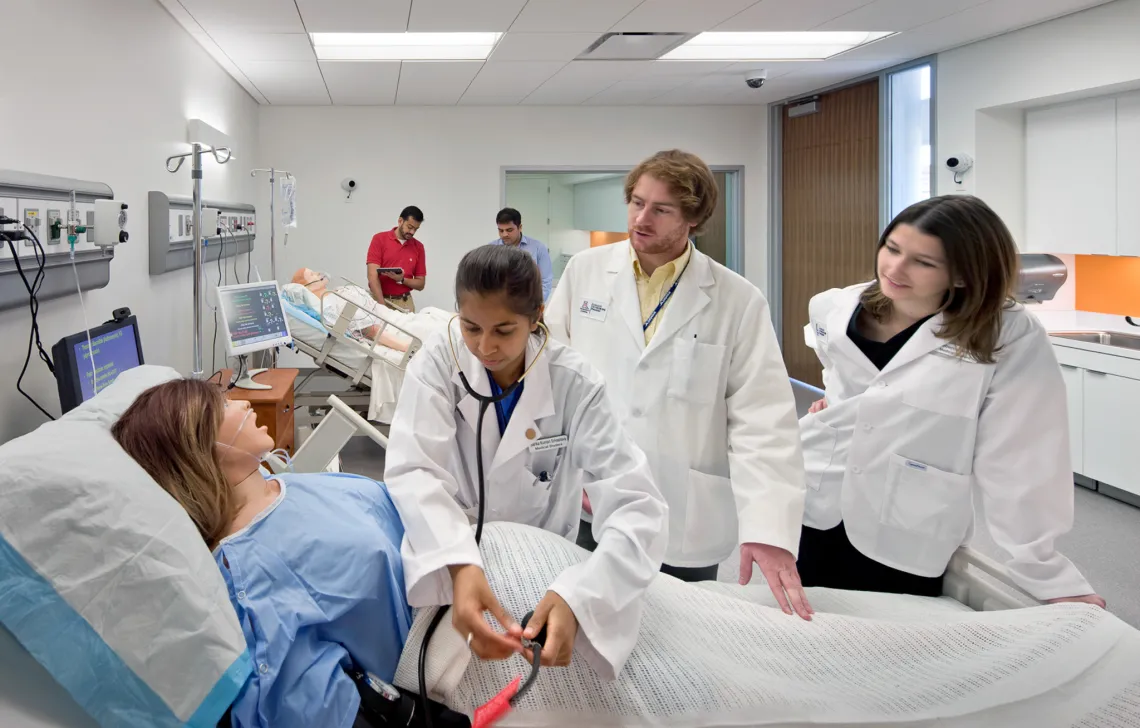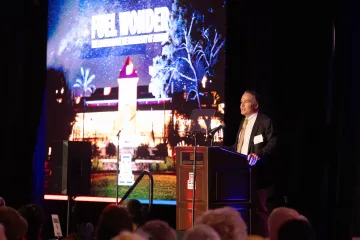A Teacher's Vision
Fredric Wondisford is positioning the College of Medicine – Phoenix to become one of the nation’s top medical schools.

UArizona medical students
Photo: UArizona Health Sciences
In October 2023, Fredric Wondisford was named dean of the University of Arizona College of Medicine – Phoenix.
With over three decades of experience in academic medicine and translational research, Wondisford relocated to the Valley of the Sun, an exciting change for someone who had previously lived no further west than Chicago.
While he had a distinguished track record at institutions like Johns Hopkins University, the University of Chicago and Harvard University, Wondisford’s groundbreaking achievement came from the development, patent and clinical launch of Thyrogen. The innovative product, a form of recombinant thyroid stimulating hormone, changed the standard of care for patients with thyroid cancer.
However, his path began in a small Italian immigrant neighborhood hidden behind the Youngstown Sheet and Tube mills of Ohio.
“My interest in medicine actually came out of the fact that my uncle was the local family doc for the community, pro bono,” Wondisford recalls. “He would take me around and meet all of the families.”
Despite his father urging him toward a career in engineering, Wondisford decided to pursue a medical degree at Northeastern Ohio College of Medicine.
While in medical school, he connected with another student, Sally Radovick, who would later become his wife. “She was my cadaver partner,” he says. “We met over the cadaver, went through medical school together and got married.” Radovick is the director of the Clinical and Translational Sciences Institute and leader of the All of Us Research Program at University of Arizona – Banner Health.

Dean Fredric Wondisford
Photo: Chris Richards
During his residency at University Hospitals of Cleveland and Case Western Reserve University School of Medicine, Wondisford discovered a passion for teaching and scientific research. One time, he recalls, he began to talk about teaching with his mother, an award-winning second grade teacher. She asked him to “teach her something,” he says.
“So, I spent about five minutes talking to her. And then she said, ‘Fred, you know, you’re not a very good teacher.’ Which is fine. That sort of transparency and openness was sort of the definition of how she operated,” Wondisford says.
“I became a great teacher after about 15 years of practice, trial and error. It’s not easy to be a teacher.”
Wondisford says he never hid from challenges but rather sought them out.
He joined the College of Medicine – Phoenix from Rutgers University, where he served as professor and chair of the Department of Medicine in the Robert Wood Johnson Medical School, the Henry Rutgers Chair and Chancellor Scholar at Rutgers Health, and chief of the medical service at the Robert Wood Johnson University Hospital.
He chose his role at Rutgers, he says, because it was characterized as a “total rebuild.” He saw it as an opportunity to make a significant impact.
“I like to make improvements,” he says. “And I particularly like to improve an environment so that other faculty find it easier to succeed.”
While the College of Medicine – Phoenix doesn’t need reconstruction, its potential as a recently established institution is promising. “It is a unique school among medical schools in the sense that it’s moving out of the startup phase and into a rapid growth phase,” Wondisford says.
The demand for medical professionals is growing. Last year, the Arizona Board of Regents estimated that by 2030, Arizona’s health care sector will have a shortage of 23,000 health care professionals.
The College of Medicine – Phoenix is planning to help fill the gap.
As part of his strategic vision for the school, Wondisford aims to raise the college’s visibility, foster stronger relationships with clinical partners and engage the community through a nearby clinic.
“I think that’s probably our next frontier for our school, is to really become embedded much more strongly in the community,” he says.
Situated on the Phoenix Bioscience Core, which houses organizations like the Translational Genomics Research Institute, Dignity Health Cancer Institute and the future Center for Advanced Molecular and Immunological Therapies, the College of Medicine – Phoenix offers great opportunities for collaboration and growth.
The college is the perfect place for Wondisford to bring his vision to life.
“My vision for the College of Medicine – Phoenix is to become one of the top medical schools in the United States and to improve the health of communities through distinction in personalized medical education, translational research and patient care within a culture of inclusive excellence,” he says.
